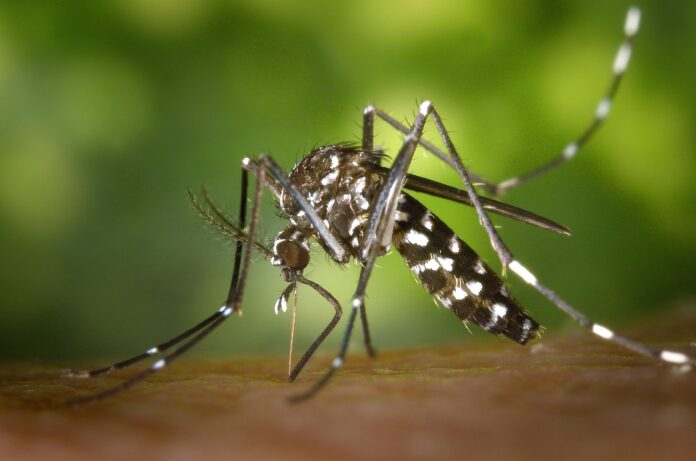The city of Nice continues its fight against the tiger mosquito. Three parks in the city center are temporarily closed from October 8 to 10, 2025, for a mosquito control operation. This action is part of a comprehensive prevention plan launched in the spring.
Since this morning, Wednesday, October 8, three green spaces in central Nice—Mozart Square, Jean Moreno Park, and Alziari de Malaussena Square—are closed to the public. These locations are hosting a mosquito control operation conducted by municipal services. The goal is to reduce the presence of the tiger mosquito in areas where reports have increased in recent weeks.
The closure will extend until Friday, October 10, inclusive. During this period, teams will intervene in both vegetated areas and around stagnant water points. Although the name of the product used has not been disclosed, the city assures that it has been approved by health authorities and is applied in accordance with safety protocols. Residents have been informed of the operation through notices and communications from the town hall.
The tiger mosquito is not new to Nice. It was first spotted in the region more than twenty years ago. The insect, recognizable by its black and white stripes, has adapted to urban life. It reproduces in small amounts of water, often around homes. Its presence is not just a nuisance. It can transmit diseases like dengue, chikungunya, or Zika.
A reinforced prevention plan since June
At the beginning of the summer, the municipality launched a “Plan Mosquito 2025”. This initiative relies on coordinating several services: public health, environment, and civil security. Under the direction of the Agency for Health Safety, Environmental and Risk Management, it combines prevention, research, and targeted interventions.
More than 60 passive traps have been installed in the most affected neighborhoods. Four more innovative devices complement this network. These traps, emitting carbon dioxide, attract female mosquitoes during oviposition. They help evaluate population density and guide treatment operations.
The plan also relies on scientific research. A thesis is currently funded by the city under the supervision of Dr. Pascal Delaunay. It aims to better understand the reproduction cycles and insect concentration zones. In parallel, wastewater is analyzed weekly to detect potential viruses.
During the summer, an information campaign was disseminated to the general public. Posters, radio spots, and field interventions reminded the public of simple actions to limit proliferation: emptying saucers, cleaning gutters, covering water collectors. An anti-mosquito brigade also visits residents to diagnose reproduction sources and install oviposition traps if necessary.
A collective mobilization
For the mayor of Nice, Christian Estrosi, this fight is primarily a collective matter. He had reiterated this during the presentation of the plan in June: “we must act at all levels, with residents, researchers, and public services.” The message is clear: the success of the initiative relies on everyone’s vigilance.
The health authorities share this approach. Dr. Christelle Pomares, from the Nice University Hospital, reminds people that “the first reflex is to eliminate any stagnant water around your home.” The departmental director of ARS PACA, Romain Alexandre, emphasizes the importance of cooperation between institutions. Links have been established with Monaco and Italy to pool surveillance systems.
In September, the city increased its vigilance after several reports in the department. A new oviposition trap was installed at Saint-Isidore School following complaints from parents. These simple and inexpensive devices allow monitoring the phenomenon’s evolution.
Nationally, nearly 500 cases of chikungunya have been recorded this year, including 140 in the Alpes-Maritimes. Even though Nice has not reported any local cases, the municipality prefers to anticipate. This week’s mosquito control is part of this preventive logic.
The affected parks will reopen their doors on October 11, unless the situation changes. In the meantime, the city encourages residents to remain vigilant and report any unusual proliferation via the Allo Mairie service.
The fight against the tiger mosquito is not only conducted at the municipal level. It also involves simple and repeated actions. Closing water tanks, emptying garden buckets, and maintaining balconies. Modest yet essential actions to contain an insect now well established in the Nice landscape.


